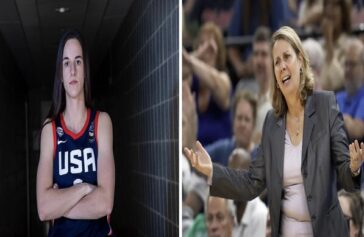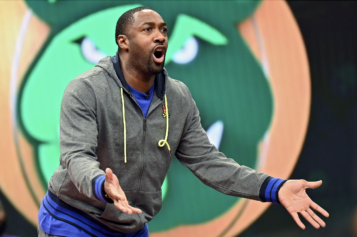It’s almost unfair to put Team USA Women’s bobsled pilot Jazmine Fenlator in a pressure cooker situation and expect her to do anything but turn it up and seek victory. Pursuing Olympic dreams and piloting fast-moving bobsleds are imposing obstacles for most athletes. But when you've lived Fenlator's choppy life, navigating a canoe-like contraption that glides within a confined, twisting and turning maze of ice at speeds as high as 100 kilometers per hour is easy money.
Bobsledding at any level is physically and mentally burdensome. But those athletic challenges mirror Fenlator’s emotionally gut-wrenching life off the ice, so they work hand-in-hand to create one positive, relentless, energetic, person who applies these attributes to her world class navigational skills.
Fenlator is the third-ranked women’s bobsled pilot in the U.S. With a couple of days of qualifying racing to go before the 2014 Winter Olympics pops off in Sochi, Russia on February 6, she’s on the cusp of snagging a Team USA jacket. “If she holds her position until Sunday when we nominate our Olympic bobsled team,” said USBSF Marketing & Communications Manager Amanda Bird…“we expect to qualify three sleds.”
Fenlator sat down with The Shadow League's J.R. Gamble and spoke about her journey, beginning with her early decision to become an Olympic athlete. As a dance enthusiast growing up in Wayne, N.J., Fenlator didn’t participate in organized sports until high school, but she always knew she was going to do it big in a field that required supreme physical athleticism. She just didn’t know what path of ground-breaking success she would walk. She had no idea she’d be an African-American woman excelling in a sport that has no cultural, geographic or historical connection to the African-American community.
Fenlator: I became active at four and five years old in dance. I thought I was going to be on Broadway and make modern dance an Olympic sport. That’s what I told my mom. So I actually grew up not doing any organized sports… tap, jazz, ballet. I tried out for The Lion King on Broadway, and did things like that until age 12. I slowly transitioned into High School sports and tried out for track. I received an academic and athletic scholarship to Rider University for college. I always had that Olympic spirit. Through my path of being active and fit and moving through sports, I fell in love with track and field.
Her Olympic juices were further sparked by images of legendary athletes captivating the world and conquering the impossible.
Fenlator: Watching (four-time Olympic Gold medalist) Michael Johnson and all of these different, amazing track and field people every year…they were breaking world records. I said, “you know I want to be that person." I want to be in the Olympic Games and make a statement. Do something that’s never been done like when all of these people said no one would run under 10 seconds in the 100 and now the record is like 9.60-something. It's insane. So I think I’ve had that type of motivation and inspiration. I just had to wait on what path it would lead me too.
Two people in particular have provided Fenlator with the support and encouragement needed to embark on this improbable Olympic journey. A journey that seemed to emerge out of thin air, but as Fenlator’s bobsled career continues to blossom, its clear that its the destiny she's been chasing since her youth. The destiny Fenlator’s lupus-stricken and tragedy-resilient mother still cultivates to this day.
Hurricane Irene flooded and ravished her family’s New Jersey home in 2011, shortly after Fenlator officially began her Olympic quest. She considered quitting bobsled and returning to her corporate job in New Jeru to be close to her family, but her mother wouldn't have it.
Fenlator: I was training while it happened, so my mother and sister caught the brunt of it. It was rough. My mom and sister were living in a hotel so I was sending money home, just trying to do all I can to support and help them. Then we lived under construction for eight months and my mom has very bad health. She’s had quadruple bypass heart surgery, three strokes, and her lupus (which she was diagnosed with at age 23) came out of remission during those two years as well. So we do live very special day to day.
Fenlator said that her mom’s goal for all of her kids is just to push through and make it. Family always provides the foundation for a child’s epic accomplishments as an adult. But along the way there are people who also emphatically shape their goals, opportunities and broaden the scope of their possibilities.
Fenlator: My track and field coach at Rider- Rob Pasquariello – knew I wanted to pursue track after graduating but also knew it was going to be a little tough with my genetics because I’m a thrower and some of the girls I was competing against were much bigger than myself. I’m extremely athletic and skillful within my range but to get to that next level was going to be extremely tough. Coach mentioned bobsled as an option and I sent in my athletic resume. When the national team calls you up to try out without ever meeting you – just by looking at a piece of paper – then you kind of know that’s something special and you should jump on that.
Mike Pellet is a Track and Field Throws Coach and former Division 1 Track and Field athlete. In his article, “What Qualities Make Up a Good Thrower,” he believes that a major attribute of a good thrower, “is the eagerness to learn the event and become a student of the art. By becoming a student of the event, the athlete chooses to make track and field a way of life.”
Jazmine has the athletic goods, but her thirst for knowledge was a key factor in Pasquariello believing she could transition to bobsled at a world class level. He instilled the confidence for Jazmine – a superb student – to test the boundaries of her athleticism.
Fenlator: He’s been a huge mentor for me throughout my athletic career and really believed in my potential. I said early on that I’m going to be an Olympian. He saw that determination and drive in conjunction with my hard work and skills and knew I had the tenacity to make it happen. It was just a matter of how.
So how does a 22-year-old black girl, who grew up on a shoe-string budget and lived about 20 minutes from the carjacking capital of the world end up on the cusp of making Winter Olympics history? Perfect timing had something to do with it for Fenlator who is now 28 and an elder statesman of Team USA's bobsled squadron.
Fenlator: When I tried out, they were looking for new brakemen (some publications will describe them as brakewomen). Team USA was in a rebuilding stage. The Torino Olympics just happened in 2006 and a few brakemen retired so after that year Team USA had pilots and no brakemen.
Team USA did a huge recruiting search around the nation and just weren’t finding the quality athletes it needed. A major hinderence was that a lot of potential bobsledders wanted to go to the Summer Games in Beijing so they weren’t risking injury attempting to learn a dangerous winter sport. The dirth of bobsledders led to a philosophical shift in the kind of athletes Team USA pursued and the way it utilized its current bobsledders moving forward.Team USA expanded its pool of potential candidates and began looking for dynamic athletes in other sports such as track and field, who had a skill set that could translate into sled success at the Olympic level. Fenlator is a pioneer of those caliber of crossover athletes.
Fenlator: With Team USA we are taking really talented brakemen who may be interested in continuing their careers and becoming a pilot and putting them in the drivers seat because our sport revolves around velocity and having a certain skill set and piloting, so you can take a brakeman whose fast and explosive and now put them in the front seat with another top brakeman. Then you’re going to have domination on the hill basically.
Training At Lake Placid
Fenlator: No one actually goes down there to bobsled when they try out. It’s similar to the NFL Combine, which has 12 items that the NFL is testing a football player's skills on. You’re not necessarily playing a game at the combine. They are throwing, passing, catching running routes, jumping… all of these aspects of athleticism.. then you get graded on each skill set and placed where your strengths are best suited.
Bobsled has an 8-item combine which tests our sprinting, flying 30, power clean (which is a full body exercise testing for full body strength and explosiveness).. also the back squat which tests your overall strength and core as well as a sprint, shot put toss and broad jump which tests your explosiveness or outward motion. When you’re bobsledding you push the sled outward. You’re not pushing up or down. So they use those items and you can get a high of 800 points or lower, but its capped at 100 points per skill category.
Fenlator: Based on that testing they say, “Ok it seems like you can transfer your skills, so let’s see you push a sled.” So we have a push track and there’s an ice house in Calgary where they teach you how to push a sled. Lake Placid has similar weather conditions… that’s where I did all of my training. After I tried out they said, "the ice opens October 1 in Lake Placid. We have our team trials races so pack your bags and get ready because you won’t be home for six months. We will be traveling and you’ll be on some type of circuit because of your skill set.”
Two weeks after sitting in a bobsled for the first time, Fenlator was competing in a National Team trials competition on the ice at Lake Placid, pushing with different drivers and learning how to use the equipment.
Fenlator: I placed like third or fourth and my driver was a new pilot as well. The first month was a huge learning curve and growing process.
Working on a two-woman bobsleigh, Fenlator started out as a brakeman in the back of the bobsled and has developed into her current role as a pilot.
Fenlator: I transitioned to the pilot seat with hopes of being successful and fortunately I’ve been growing and growing in that process. I’m competing against World Champions and multi-medal Olympians and I think I’m holding my own.
Fenlator’s bobseld-rise has been consistent since her arrival in 2007. She finished 8th in the World Championships in the 2012-2013 season and she’s racking up medals in World Cup competition en route to solidifying her Olympic spot for Sochi.
Fenlator is one of 12 current and former athletes that make up Team Liberty Mutual, with the U.S. Olympic sponsor helping raise much-needed funds to make sure that the athletes not just get to Sochi, but that they help assist those who have helped them along their Olympic journey. Her athletic prowess is well-noted, but Fenlator's equally-impressive social awareness is why she's considered by many to be a barrier-breaker in women’s athletics.
In many regards, that is true. Team USA didn’t have the benefits of social media like The Shadow League, Twitter and Facebook in 2002 when former University of Alabama at Birmingham sprinter Vonetta Flowers became the first African-American to win a gold medal or any medal in Winter Olympic competition as a brakeman. After failing to make the 2000 US Summer Olympics squad in Sydney, Australia, Flowers eventually fulfilled her Olympic dream through bobsledding.
Naturally, Fenlator is a huge fan.
Fenlator: Vonetta opened the door for African-American women and women of other ethnicities and enlightened them on winter sports. She came from track and field so she kind of blazed that path for us. I met her and it’s a huge honor because she's really brought a lot of knowledge and exposure to our sport.
Flowers has to be thrilled with how quickly her win has translated into major diversity on Team USA. Fenlator is picking up where Flowers left off, as an even more visible ambassador for increasing diversity in Winter Olympic sports.
Fenlator: Between this year and last year about six of the eight women on the team were an ethnicity other than Caucasian and for a winter sport that is very unheard of. I’m trying to use that platform to show that you don’t have to be caged or boxed in to a certain type…if you have a dream or a skill set to pursue something then no one is going to define it except you. You don’t have to be a track and field athlete because you’re black and fast. You don’t have to pick up a football because you grew up in North Carolina or Texas and that’s what they do there. You can be whatever you want to be. If you have the tenacity to pursue it…go for it! Two-thirds of Team USA's pilots are African–American and three of the six brakemen are “black or of mixed ethnicity.”
Fenlator says that color infusion is no accident.
Fenlator: Its unusual and I think a lot of people such as myself who have been in this sport since 2007 have tried to recruit people based on talent, not based on race or where they’re from. Elana Meyers is from Atlanta, Lo Lo Jones is a former high-profile Olympian from Iowa residing in Louisiana. Lauryn Williams is from Texas, born and raised in Florida. Aja Evans is a former shot put and track star out of Chicago (and 2012 USBSF Rookie of the Year). We come from all over the nation. Theres no bobsledding anywhere (laughter)… its one of those sports that you need exposure to let people know about it.
Super recruiters and mentors like Fenlator have made Team USA a top bobsled squad with aspirations to flood the medal stand at Sochi. The trial and error involved in building the perfect tandem has seen Fenlator experience success with several different new brakemen, including Jones.
Jones is using bobsledding as sort of a “redemption sport.” The 11-time, LSU All-American was favored to win the 100 meter hurdles at the 2008 Beijing Olympics, but tragically tripped on the penultimate hurdle, finishing seventh.
Lately, Fenlator’s been riding with another African-American newbie Lauryn Williams, a 2012 Olympic gold medalist in the 4×100 meter race, who got in a bobsled for the first time in October 2013 after finishing third in the U.S. National Bobsled Push Championships. She’s made a fast transition and could become the first African-American athlete to medal in the Summer and Winter Games.
Never one to let the enormity of the task deter her ambition, Fenlator admits that track and field would have been an easier and less-entailed path. Even so, she never thinks about what her life would be like if she kept pursuing track and field instead of chasing the speed freeze. The instant gratification and fleeting fame of track, can’t compete with the workman-like qualities associated with bobsledding which makes Fenlator feel like a true American hero.
Fenlator: With Track and Field you have this sense of being free because you’re out on a track. It’s beautiful and really sunny. It’s very rare that you have a crazy, rainy day where you have to run and you’re just free and open and most of the crowd is just there so hyped. They just want to see your performance. It’s easy for people to relate too and talk about.
Bobsleds a whole other ball game. It’s a grueling, grimy, grinding sport. It’s a sport that keeps you grounded there are so many different variables and little tedious things. When I did track and field I warmed up, I picked up my spikes, I went to the line and worried about me. In bobsled I’m worried about a 400-pound sled that’s worth over $150,000. The runners on it are about $6000. I have a brakeman depending on me to navigate this thing at over 85 miles an hour and in less than a minute, as safely as possible.
Because if they do their job pushing me fast, then I better do my job getting us to the bottom fast…and win a medal or have a top performance. I’m my own mechanic. All I had to do in track was change my spikes out or change the wire on my hammer. That was just annoying stuff. But now I have to sand my runners – which are the blades at the bottom of the bobsled- by hand. That takes two hours but at this point its the most efficient way because a sand machine would be quicker but won’t work for optimum performance. I have to work 16-hour days in bobsled but I also know that there's the single parent working 16 hour days to put food on the table and that’s the American way… and bobsledding represents all of those hardworking principles.



